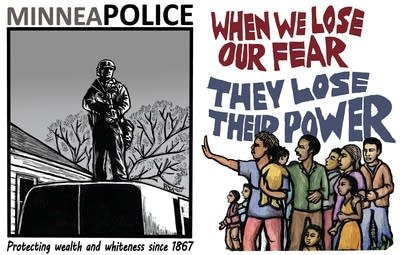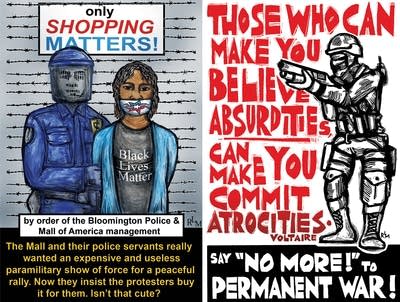Artist renders social causes in posters and prints

Go Deeper.
Create an account or log in to save stories.
Like this?
Thanks for liking this story! We have added it to a list of your favorite stories.
Ricardo Levins Morales doesn't think of himself as an artist so much as he does a healer.
"I consider my work to be medicinal," he said. "And the artwork that we're surrounded by, here in this shop — I think of them as nutrients and antibodies."
For more than four decades, Morales has produced art that speaks to the environment, workers' rights and racial equity.
On a recent Saturday morning, shoppers like university student Desirae Hammond stopped in Morales' Minneapolis studio storefront looking for holiday gifts among the colorful posters, cards and prints.
Turn Up Your Support
MPR News helps you turn down the noise and build shared understanding. Turn up your support for this public resource and keep trusted journalism accessible to all.

"It's really wonderful to see something you believe in reflected so beautifully," she said.
David Nicholson, executive director of Headwaters Foundation for Justice, said it's hard to overstate the importance of Morales' work. There's a reason Martin Luther King said "I have a dream" and not "I have a plan," he said. The importance of art in social justice movements is that it captures people's imagination.
"His images invoke a sense of what's possible and help to represent the struggles that people are in," Nicholson said. "They're haunting, moving, inspiring images."
Much of Morales' work features people of color. In one poster, a black schoolteacher writes "We Can Do It" on a chalkboard. Many posters include inspirational quotes.
"For some communities, the thing that they've forgotten is that they're beautiful and they're capable," Morales said. "Just that very simple, basic thing. So I hold up a mirror that filters out all the toxic messages, and they see that in my art, and I think that's what draws people in. People more than anything hunger to be seen — hunger to be recognized."

Morales was born into an activist farming family in Puerto Rico. When he was a young teenager in the 1960s, his family moved to Chicago. In 1969 he was drawn into the protest movement after the local police killed two young Black Panther leaders, Fred Hampton and Mark Clark.
In 1976 he moved to Minneapolis and shortly thereafter co-founded the Northland Poster Collective.
For 30 years the Northland Poster Collective churned out posters, T-shirts, buttons and bumper stickers designed to help organize, educate and motivate. The collective closed in 2009.
"If the American Indian Movement or an antiwar group or a peace and development organization wanted to have an image, or wanted to print some posters for a fundraiser, we provided a place where they could come," he said.

Morales said his method of art-making involves diagnosing an illness and figuring out the proper treatment. One image may be designed to remind people of history, another to help them overcome fear. A poster depicting Trayvon Martin accompanied by a quote from civil rights activist Ella Baker spread like wildfire across the nation as it was used in workshops and protests and printed in books.
His ultimate goal, he said, is to change people's perceptions.
"In this current climate, where people are targeted and demonized, at one time it would be Japanese, Jews, black folk, Puerto Ricans," he said. "Now it's Muslims and Middle Eastern people. And people are easily stampeded by that in this country. But that means that if you simply create an image that shows people as being human, that is already subversive."
At a time when many people are feeling isolated and unheard, Morales is creating art to help them find their community and their voice.





